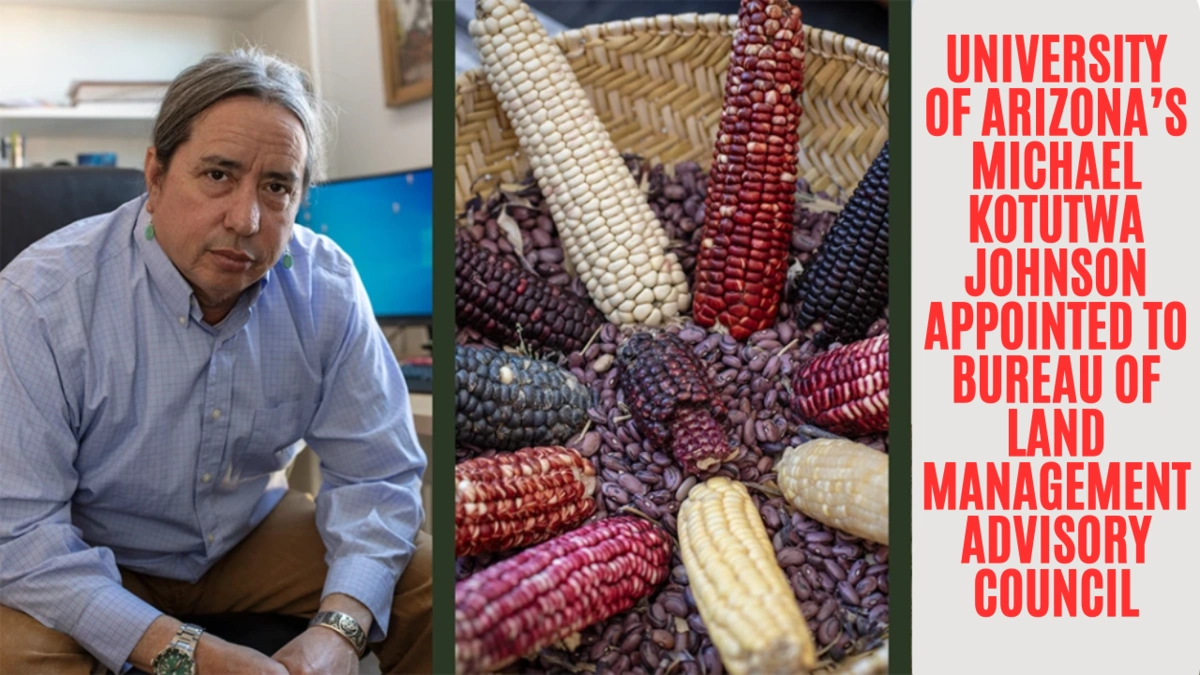Michael Kotutwa Johnson, Ph.D., an assistant specialist at the University of Arizona’s Indigenous Resiliency Center and a member of the Hopi Tribe, has been appointed by U.S. Secretary of the Interior Deb Haaland to the Bureau of Land Management (BLM) Arizona Resource Advisory Council (RAC). This new appointment places him in a pivotal position to influence land management practices and policies for millions of acres of federal lands and subsurface minerals in Arizona.
The RAC is a 15-member advisory body that provides input and recommendations on the management of natural resources across Arizona’s BLM-managed lands. These lands span over 12.1 million acres, and the council’s discussions cover a variety of environmental, recreational, and cultural challenges. As part of his three-year tenure, Kotutwa Johnson will contribute to policy recommendations that balance the needs of multiple stakeholders, including Native American tribes, ranchers, conservationists, and recreational users.
“I’m honored to be invited,” Kotutwa Johnson remarked. “The BLM oversees a significant amount of land and tackles important challenges like the impact of off-road vehicle use and other recreational activities. These are issues that affect everyone.”
The appointment follows a rigorous vetting process, which included review by the White House and the Department of the Interior. Despite the challenging process, Kotutwa Johnson expressed his excitement to serve in this role. “I made it!” he laughed, emphasizing his commitment to making a positive impact on land management policies in Arizona.
Kotutwa Johnson’s appointment is seen as a major opportunity to bring indigenous perspectives to federal land management decisions. His expertise in natural resource management, coupled with his deep connection to the Hopi community, allows him to offer valuable insights into issues like land preservation, sustainable agriculture, and food security. He is particularly focused on fostering collaboration between Native and non-Native communities to address shared challenges.
One area Kotutwa Johnson is keen on addressing is the issue of food insecurity, both at the University of Arizona and in Native communities across the state. He shared his concerns about the struggles of Native students, particularly those who rely on food pantries to meet basic needs. “Volunteers had to collect donations at a women’s basketball game to keep our Native student food pantry stocked,” he said. “Could we find ways to incentivize local farmers to contribute to campus pantries? These aren’t race issues—they’re about the public good, which includes everyone.”
Additionally, Kotutwa Johnson is committed to finding solutions that can benefit both Native communities and other sectors of the public. One example he cited is the lack of meat-processing facilities on tribal lands. “If we had meat-processing facilities on tribal lands, it would benefit everyone,” he explained. “Arizona ranchers, Native communities, and the broader public could all benefit from shared infrastructure. Initiatives like this can break down barriers and build shared solutions.”
Marie Teemant, a Research Development Services associate specializing in faculty nominations for honors and awards, celebrated Kotutwa Johnson’s appointment, noting that his unique blend of academic expertise and lived experience will make him a valuable contributor to the council’s work. “His expertise in natural resources, combined with his lived experience as a member of the Hopi Tribe, brings a unique and essential perspective to addressing the complex challenges of land management,” Teemant said.
This appointment reflects the increasing recognition of the importance of Indigenous knowledge in land and resource management. As a member of the BLM Arizona Resource Advisory Council, Kotutwa Johnson will have a direct role in advising the federal government on issues such as sustainable land use, conservation, and improving relations between Native and non-Native stakeholders.
Kotutwa Johnson’s dedication to public service is an embodiment of the values of collaboration and inclusivity that he hopes will guide his tenure on the council. By bridging cultural and environmental concerns, Kotutwa Johnson hopes to foster solutions that not only benefit Indigenous communities but also address broader societal needs. In the process, he aims to bring the values of stewardship, respect for the land, and sustainability to the forefront of resource management practices in Arizona.



